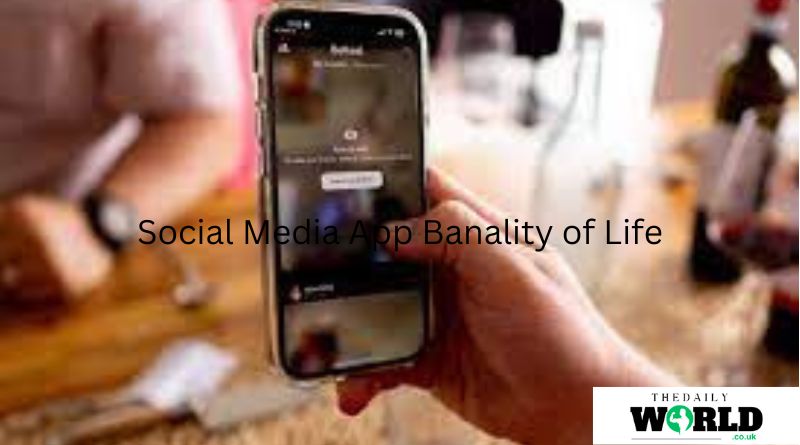In the age of digital transformation, social media apps have become an integral part of our daily lives. They offer a platform for connection, entertainment, and information sharing. However, this constant connectivity also brings with it a certain banality that affects our perception of life. This article delves into the social media app banality, exploring its impact on our day-to-day experiences and overall well-being.
The Ubiquity of Social Media
Social media apps are ubiquitous. From the moment we wake up to the time we go to bed, these platforms are just a tap away. Whether it’s scrolling through Instagram, checking Facebook updates, tweeting, or watching TikTok videos, social media apps have woven themselves into the fabric of our lives. This constant availability creates a sense of routine and predictability, leading to the banality of social media usage.
The convenience of these apps makes it easy to spend hours mindlessly scrolling through feeds. This habitual behavior can detract from more meaningful activities and interactions. Instead of engaging in real-world conversations or pursuing hobbies, many find themselves lost in the digital world, consuming repetitive and often trivial content.
The Repetition of Content
One of the key aspects contributing to the banality of social media apps is the repetition of content. The algorithms behind these platforms are designed to show users more of what they like, leading to an echo chamber effect. As a result, users are often exposed to the same types of posts, memes, and videos over and over again.
This repetition can make the experience of using social media apps monotonous. The excitement of discovering new content is replaced by the predictability of seeing similar posts. This can lead to a sense of boredom and dissatisfaction, as the novelty wears off and the content becomes mundane.
The Impact on Mental Health
The banality of social media apps also has significant implications for mental health. Studies have shown that excessive use of social media can lead to feelings of anxiety, depression, and loneliness. The constant exposure to curated images and highlight reels of other people’s lives can create unrealistic expectations and feelings of inadequacy.
Furthermore, the mindless scrolling and consumption of repetitive content can lead to a lack of fulfillment and a sense of purposelessness. Instead of engaging in activities that bring joy and satisfaction, many find themselves trapped in a cycle of passive consumption, which can negatively impact their mental well-being.
The Illusion of Connection
While social media apps are designed to connect people, they often create an illusion of connection. Liking a post or leaving a comment is not the same as having a meaningful conversation or spending quality time with someone. This superficial interaction can contribute to feelings of loneliness and isolation.
The banality of social media interactions can also lead to a decline in the quality of relationships. When the majority of communication happens through short messages and emojis, the depth and richness of real-world interactions are lost. This can weaken social bonds and reduce the overall quality of relationships.
The Influence on Creativity
The repetitive nature of social media content can also stifle creativity. When users are constantly exposed to the same types of posts, it becomes challenging to think outside the box and come up with original ideas. The pressure to conform to trends and gain likes and followers can further limit creative expression.
Moreover, the time spent on social media apps could be used for more productive and creative pursuits. Instead of scrolling through feeds, individuals could be painting, writing, or learning a new skill. The banality of social media consumption takes away valuable time and energy that could be channeled into creative endeavors.
Breaking Free from the Banality
While the banality of social media apps is a prevalent issue, it is possible to break free from this cycle. Here are some strategies to help mitigate the negative effects of social media and make the experience more meaningful:
- Set Boundaries: Limit the time spent on social media apps. Use features like screen time trackers to monitor usage and set daily limits.
- Curate Your Feed: Be selective about the accounts you follow. Choose content that inspires and uplifts you, rather than mindlessly following trends.
- Engage Mindfully: Instead of passive scrolling, engage actively with the content. Leave thoughtful comments, start conversations, and share your own experiences.
- Take Breaks: Periodically disconnect from social media to reconnect with the real world. Use this time to engage in hobbies, spend time with loved ones, and explore new interests.
- Focus on Quality Over Quantity: Prioritize meaningful interactions over the number of likes and followers. Build deeper connections with a smaller group of people rather than seeking validation from a large audience.
The Future of Social Media
As social media continues to evolve, it is crucial to be mindful of its impact on our lives. The banality of social media apps is a reflection of how these platforms are used rather than their inherent nature. By adopting mindful and intentional usage, it is possible to harness the benefits of social media while minimizing its negative effects.
The future of social media lies in finding a balance between digital connectivity and real-world experiences. As users become more aware of the banality of social media apps, there is potential for a shift towards more meaningful and enriching online interactions. This could lead to a healthier and more fulfilling relationship with social media.
Conclusion
The social media app banality of life is a phenomenon that affects many users today. The constant repetition of content, the illusion of connection, and the impact on mental health are significant concerns. However, by setting boundaries, curating feeds, and engaging mindfully, it is possible to break free from the cycle of banality and create a more meaningful social media experience. As we navigate the digital age, it is essential to strike a balance between the convenience of social media and the richness of real-world interactions.
Read also: check













